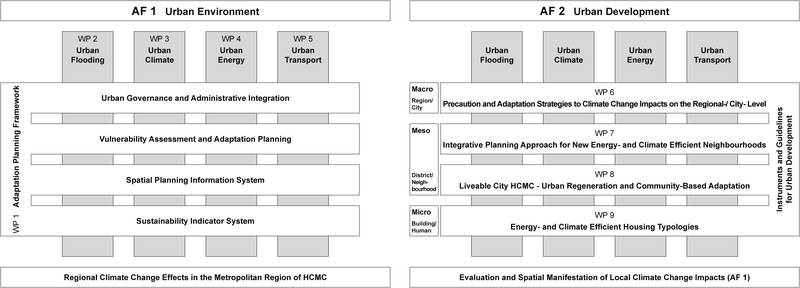Applicable Instruments and Methodologies
The research on climate change has two main points of emphasis: environmental protection, the mitigation of further changes in the climate due to human influences; and protection from the effects of climate change, the adaptation to the consequences of climate change. Mitigation includes the development of new technologies which use less resources and produce less emissions. Adaptation encompasses measures for reducing the vulnerability of natural and human systems to the adverse effects of climate change.
In the current phase, a multi-layered typological approach which was developed in the preliminary phase of research will be utilized to assess the sustainability of urban settlement developments. This Urban Typology Framework will provide important environmental and social information which in turn will be drawn upon in the vulnerability assessment, based on strategic environmental assessment (SEA). SEA is both a valuable process and a response instrument for transferring scientifically well understood and documented problems of climate change into adapted planning systems and for selecting criteria to assess these in the context of complex planningmsystems. In an interdisciplinary approach, the assessment criteria and methodology will be selected with the aim of assessing contents and objectives of the regional land-use planning system for their adequacy and efficiency in adaptation to climate change.
The Action Field 1 - Urban Environment encompasses the Work Packages:
- WP 1 Adaptation Planning Framework,
- WP 2 Urban Flooding,
- WP 3 Urban Climate,
- WP 4 Urban Energy,
- WP 5 Urban Transport.
The primary objective within Action Field 2 is to mainstream sustainable urban development strategies under the conditions of climate change into the urban system of HCMC. Based on the knowledge gained from the research in Action Field 1, small-scale projects will be conducted with the Vietnamese partners to promote best-practices for further appropriate responses. On the practical level, the instruments of zoning and building codes will be examined and recommendations made for their improvement with regard to sustainable urban development, energy-efficiency and resiliency to adverse climate changes.
The Action Field 2 - Urban Development includes the following four Work Packages:
- WP 6 Precaution and Adaptation Strategies to Climate Change Impacts on the Regional and City Level,
- WP 7 Integrative Planning Approach for New Energy- and Climate-Efficient Neighborhoods,
- WP 8 Livable City - Urban Regeneration and Community-Based Adaptation
- WP 9 Energy- and Climate-Efficient Housing Typologies.

